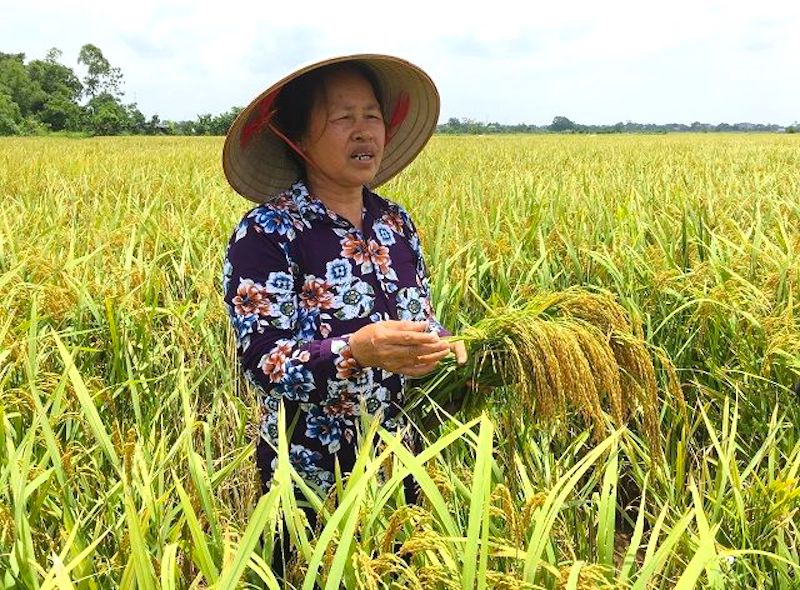Hanoi to bolster the value of rice in domestic and overseas markets
The city will create conditions for the private sector to join the establishment of a closed rice chain.
Hanoi needs to create large-scale rice fields, synchronize harvest and production to form a value chain, and develop high-quality varieties of the capital, according to Minister of Agriculture and Rural Development Le Minh Hoan.
Positive results from large paddy areas
| A paddy field at Dong Phu Commune in Chuong My District. HNT Photo: Tung Nguyen |
As a locality with a small rice acreage, Dan Phuong, the suburban district of Hanoi, has turned to organic farming by growing high-quality rice varieties to increase farmers’ income.
According to Thieu Van Son, Chairman of the district Farmers' Association, in the spring crop of 2021, the district has chosen ST25, which was voted the World’s Best Rice, for organic farming.
As a result, Tho An Commune harvested 63.3 quintals of ST25 per ha. The rice variety fully met the criteria of specialty rice and being favored by domestic and international markets.
In the neighboring district Ung Hoa, one of the major rice-growing areas of the city with more than 8,000ha, the acreage under high-quality rice varieties accounts for more than 70% of the area. Among them, more than 3,700ha of Japonica rice are planted under the standards of VietGAP and organic farming.
Cao Thi Thuy, Director of Doan Ket Agricultural Service Cooperative, said its well-known rice namely Khu Chay is a type of Japonica rice that is grown in large paddy plots and the production process meets VietGAP standards.
Organic farming practices are being expanded. The organic rice after being harvested is pre-processed and packed under a closed production line, Thuy added.
Similarly, Dong Phu Commune in Chuong My District has also successfully grown organic rice in an area of nearly 50ha and received ordered from local businesses to distribute Dong Phu rice in the domestic market as well as export it to the US.
Green Path Vietnam Trading and Export JSC, one of the distributors of Dong Phu rice, exported 10 tons of rice to Australia, the US, Japan, and South Korea in 2020. “We continue to expand investment in organic rice areas for export,” Phung Thi Thu Huong, General Director of the company told The Hanoi Times.
However, Huong is also concerned that though Hanoi has high-quality rice areas, infrastructure for pre-processing, packaging, and storage is too poor. “Rice must meet the requirements of traceability, food safety, and hygiene in order to penetrate demanding markets like the US and Australia. The weakness needs to be addressed soon,” she added.
Bolstering the value of the capital’s rice
In order to develop high-quality rice areas, the city’s agriculture sector sets a 2025 goal of expanding the areas of Japonica and high-quality rice production by another 200ha meeting VietGAP and export standards.
Director of the Hanoi Agricultural Development Center Hoang Thi Hoa said the city will deploy support packages to develop technology for drying, pre-processing, processing, and storage of Japonica rice varieties to improve the value of Hanoi rice.
“The city will form at least another two value chains of Hanoi rice to expand the market of high-quality rice and Japonica rice varieties, contributing to the development of sustainable agricultural production,” Hoa told The Hanoi Times.
From a local perspective, Vice Chairman of Ung Hoa District People's Committee Ngo Tien Hoang said in order for the district's Khu Chay rice brand to reach out to the world, the authority will create all favorable conditions to attract and link businesses in the production-consumption chain and promote the application of post-harvest technologies.
Huong from Green Path Vietnam said the company will invest in building a complex in Hanoi for verification and providing export services of agricultural products. In addition, it planned to directly support export, from pre-processing, packaging, storage to transportation.
To tap into the rice potential, the city is urging localities to accelerate the completion of infrastructure, transportation, and irrigation systems for specialized farming areas with the city’s investment.
The city will encourage and create mechanisms for businesses and cooperatives to link with farmers, forming closed value chains, thereby, increasing productivity, quality, and the brand of the capital.











